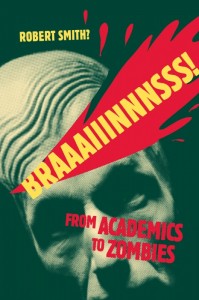OTTAWA (CUP) – In 2009, University of Ottawa mathematics and statistics professor Robert Smith and his students wrote a paper When Zombies Attack!: Mathematical Modelling of an Outbreak of Zombie Infection. After two years of significant media buzz about his unusual publication, Smith has returned as the editor of a collection of essays on the undead, entitled Braaaiiinnnsss!: From Academics to Zombies.
 “Not long after the first zombie math paper had come about, I had a meeting with the University of Ottawa Press people,” recalls Smith. “They said, ‘We’d like to see a book. Tell us what you’ve got.’ So I just sent out the call.”
“Not long after the first zombie math paper had come about, I had a meeting with the University of Ottawa Press people,” recalls Smith. “They said, ‘We’d like to see a book. Tell us what you’ve got.’ So I just sent out the call.”
Released on October 8, Braaaiiinnnsss! differs from Smith’s original paper as it discusses zombies from using a multidisciplinary approach, as contributors from various academic fields throughout world authored chapters of the book.
“The idea behind Braaaiiinnnsss! was really to extend the idea of having a conversation between academics and non-academics,” explained Smith. “[I’d] say, ‘Tell me about your academic field using zombies as a fun hook and show me how it worksŃshow me the details, show me the fun stuff, and show me the cool stuff.’ People really rose to that challenge, and I was very impressed and I learned a lot as well.”
Because the book’s chapters approach zombies from a different academic background, many issues are brought forth that were previously unconsidered, either by scholars, or by the general public.
“One of my favourites was the idea of how zombies walk,” says Smith. “They measured people walking like humans, walking like zombies, and walking like Frankenstein. What they concluded was, definitively, Frankenstein is not a zombieŃhis walk is very different.”
While the chapter on zombie walks is fairly light-hearted, other sections of the book take on more serious questions.
“Another chapter takes an approach in looking at zombies in society, but says, ‘Do zombies have rights? What’s the age of consent for a zombie? If a mother murders her zombie daughter, is that criminal or is it putting a zombie out of its pain?’” says Smith. “There’s actually some great interaction with stuff that we as humans, not necessarily just academics but we as interested citizens, might encounter via zombies.”
Although the book was released just last month, it has already received a positive response, a response that Smith attributes, in part, to the fact that reading about zombies allows us to engage with our fears in a safe way.
“There’s the specific fear of being eaten by a predator. That’s a terrifying primal fear that we don’t ever really have to engage with on a day-to-day basis,” explains Smith. “There’s also the fear of being killed by a disease, which I think zombies play into. It’s the idea of the infected, and this is sadly not quite so arbitrary, because we do face diseases all the time.”
As all the hard work that went into the book proves, Smith still believes zombies are a topic that provide readers with entertainment.
“Of course zombies are primarily fun,” says Smith, “so it’s like you come for the zombies, but stay for the interesting stuff in the academic field.”

